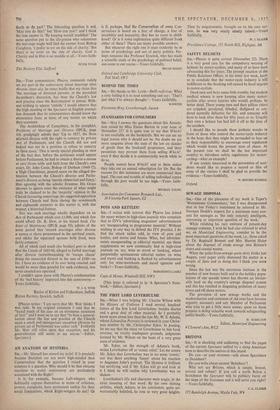SIR,—Your commentator, Pharos, comments rudely on my part in the
controversy about marriage after divorce. Inter alia, he states baldly that my claim that 'the marriage of divorced persons, at the parochial incumbent's discretion, has been the church's law and practice since the Reformation' is untrue. With- out wishing to appear 'catfish,' I would observe that the high standing of the Spectator in English journal- ism demands that its commentators should know the elementary facts, at least, of any matter on which they comment. The Archbishop of Canterbury, in his pamphlet, Problems of Marriage and Divorce (SPCK, page 14), grudgingly admits that `Up to 1857, the State allowed divorce with the right to remarry by private Act of Parliament, and the Church did not and indeed was not in a position to refuse to remarry in these cases.' That is surely special pleading in view of the fact that, before the petitioner could appear before Parliament, he had to obtain a decree a mensa et toro (from table and bed) from the Church's own court. Dr. John Cosin, Bishop of Durham (1660-72), a High Churchman, poured scorn on the alleged dis- tinction between the Church's divorce and Parlia- ment's divorce as being 'merely chimerical and fancy,' thus agreeing with the scholar• Erasmus. His Grace chooses to ignore even the existence of what might truly be claimed to be the 'majority' opinion in the Church favouring remarriage; his suggested opposition between Church and State during the seventeenth and eighteenth centuries in this matter is, with due respect, a historical fantasy.
Nor was such marriage wholly dependent on an Act of Parliament which cost £1,000, and which few could afford. Dr. R. Haw, in his biased book The State of Matrimony (SPCK page 93), admits of the same period that 'second marriages after divorce a mensa et thoro pronounced in the spiritual courts, and whilst the separated spouses both lived, were fairly common.
All of which (and much else besides) goes to show that the Canon of 1603-04, alleged to forbid marriage after divorce (notwithstanding its 'escape clause' fining the remarried divorce in the sum of £100—so far, I have no evidence of its ever being exacted, and would be more than grateful for such evidence), was never enacted nor operated.
I couldn't agree more with Pharos's condemnation of the 'bad history' imported into this controversy.— Yours faithfully, W. I. S. WEIR Rector of Kirton and Falkenham, Suffolk Kirton Rectory, Ipswich, Suffolk
[Pharos writes: 'I am sorry that Mr. Weir thinks I was rude. In my original comment I said that he "based much of his case on an erroneous statement of fact," and I went on to say that "to base a general- isation about the law and practice of the Church upon a small and unimportant exception [divorce by private act of Parliament] was rather rash. ' Evidently Mr. Weir still relies upon that exception, and his generalisation still seems to me untrue.'—Editor, Spectator.]














































 Previous page
Previous page